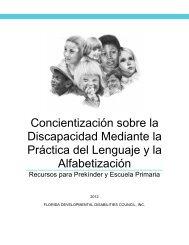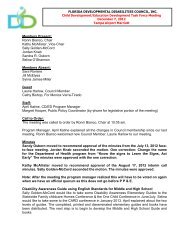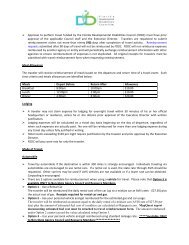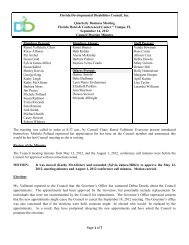Planning Ahead - Florida Developmental Disabilities Council
Planning Ahead - Florida Developmental Disabilities Council
Planning Ahead - Florida Developmental Disabilities Council
- No tags were found...
You also want an ePaper? Increase the reach of your titles
YUMPU automatically turns print PDFs into web optimized ePapers that Google loves.
the organization or financial condition of the agency changes there is no assurance your familymember will be protected.Give careful consideration to how anything you leave as an inheritance will affect your familymember’s eligibility for government benefits. For example, there are financial limits (whichchange frequently) regarding eligibility for Supplemental Security Income (SSI). Leaving assetsin excess of that amount could make the family member ineligible for SSI, and possibly Medicaidas well.TRUSTSOne way to avoid ineligibility for government benefits due to excessive assets is to establish asupplemental or special needs trust. A properly worded trust would protect against exceedingthe limited assets requirements for SSI or other similar governmental programs based on“need.” The trust funds would not be available directly to your family member, so the governmentbenefits would continue without interruption. Remember to always check with currentlaws and regulations before proceeding as Congress can change policies that impact governmentbenefits and personal finances.A trust is a legal document that provides a way for assets to be handled for someone else,including money or property. A supplemental needs trust is a trust created to supplementgovernment benefits the person with a disability is receiving without jeopardizing the benefits.This trust specifically states that the funds are to be used to supplement, but not supplant orreplace government benefits. You would also state in the trust who should receive the remainingfunds in the trust after your family member dies.A trust may be created by a parent or any other family member or interested person. This person,called the “grantor” can fund the trust by titling bank accounts, stock, or other assets in thename of the trust. The trustee is the person responsible for managing the trust fund for the benefitof the person with the disability, called the beneficiary. The grantor may also be the trusteewhile alive or capable. Co-trustees may, with differing skills and interests in the person with thedisability, be a safer choice than one trustee.Trusts may be revocable or irrevocable. A revocable trust is one that can be changed or terminatedat any time during the grantor’s lifetime. The assets in a revocable trust are still consideredto belong to the grantor and the grantor can regain possession of them. An irrevocabletrust is more permanent and cannot be changed or revoked. The assets in the irrevocable trustcannot be taken back as they are no longer considered the assets of the grantor.Trusts should always be drawn up by an attorney experienced in preparing trusts for personswith disabilities. Trusts have several advantages: they avoid some aspects of probate, canprotect government benefits, and help insure that the family member’s quality of life can bemaintained.Since the trustee is responsible for administering the trust, it is important to select someone astrustee after your death, or if you become incapable, who has the ability to administer the trustproperly, and whom you believe will handle the funds competently. Sometimes a family memberor friend is chosen to be the trustee; sometimes a financial institution is selected. Financialinstitutions usually manage trusts of larger amounts, do not monitor the personal welfare of theperson, and charge fees for services based on the amount of the trust. Such charges can significantlyreduce or even consume the assets in the trust. If a friend or family member is named, thetrust may address financial compensation for the trustee’s time and service.Chapter 9, Making an Estate Plan45











